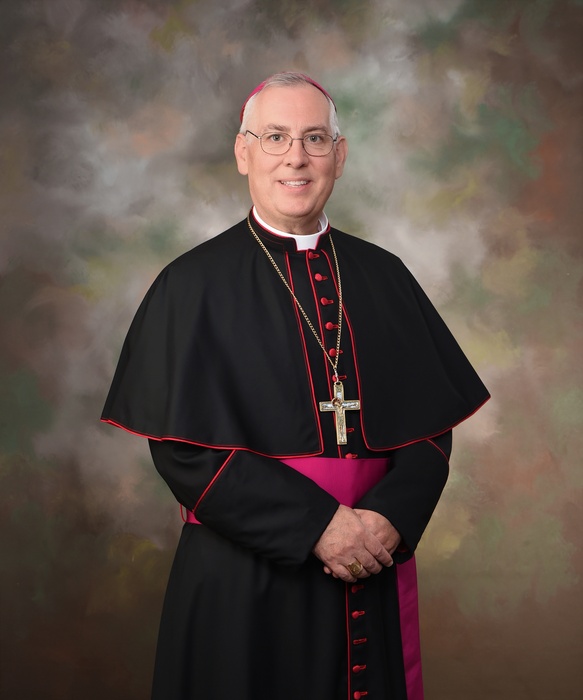April 6, 2018 at 1:53 p.m.
'WORD OF FAITH' COMMENTARY
Clarifying a previous column
I and all Scripture scholars conceive of our Sunday reading commentaries as a help for people to explore the original meaning that our sacred authors tried to convey when they wrote our liturgical texts.
Because we were taught our faith from catechisms and not Scripture, many Catholics have a difficultly understanding what it means to "exegete" Scripture: to return to its original meaning. Most of us "eisegete" our sacred writings: We hear them from the background of our own 21st-century beliefs, and subconsciously put those beliefs into the text.
Through the centuries, we've developed beliefs that run counter to biblical faith: for instance, the practice of living out one's faith perched on an elevated platform (as the fourth- and fifth-century stylites did); or the conviction that the bishop of Rome has a divine right to be a civil ruler (which lasted into the early 20th century).
On the other hand, we've also evolved beliefs that don't necessarily run counter to biblical theology, but weren't included in the faith expressed in our sacred writings - like some of our eucharistic beliefs.
Just because some biblical beliefs don't coincide with our later denominational beliefs doesn't make those earlier beliefs heretical. On the contrary, they might help us concentrate on truths that we've overlooked for centuries.
As I explained in the Holy Thursday commentary, I employed the term "generic" presence of the risen Jesus in the Eucharist as a way to describe our belief that Jesus "transubstantiates" the bread and wine whenever "a properly-ordained priest says the exact prescribed words over the correct elements in the context of a valid Mass."
Paul, for instance, knew nothing of such a process. They simply didn't have priests, as we know them, during his day and age. As is clear from the entire section on the Lord's Supper in I Corinthians 11, the Apostle's description of what Jesus said and did during the Last Supper was triggered by the non-dying-to-self behavior of some Christians during eucharistic celebrations in Corinth.
A significant number of the community's well-to-do refused to die enough to themselves to share their food and drink with the community's poor. As Paul would later explain in chapters 12-14, only those who die to themselves to form one community become the body of the risen Christ. Those who do not "recognize the body" in those participating in the breaking of bread are regarded by Paul in chapter 11 as "unworthy" to receive the body and blood of Christ.
In biblical eucharistic theology, Jesus only becomes present when people recognize His presence in one another. Our early Christian authors believed that always entailed a death on the part of the participants.
Years ago, I presided at a Eucharist in Belize in which the community was completely divided over a recent event. The proponents occupied either side of the church and glared at one another during the celebration. Though I "said the Mass," today I question whether the risen Jesus was actually present during that particular breaking of the bread. I certainly was a validly-ordained minister and said all the words of consecration correctly over the approved species - but no one seemed willing to die enough to themselves to actually become the Body of Christ. We, in Paul's term, weren't "Church."
It's no wonder theologian Rev. Karl Rahner came up with his conclusion that the first Christians believed the risen Jesus ceased to be present in the bread and wine after the community disbanded. (Otherwise, I presume we'd have had tabernacles from the earliest days of Christianity.)
If I could rewrite my Holy Thursday commentary, I certainly would more clearly explain in the last paragraph that Passover was the commemoration of Yahweh freeing the Israelites from Egyptian slavery. That freeing dimension of the celebration seems to be one of the reasons Mark (and Matthew and Luke, who copied him) hooked up the Eucharist with Passover. Participants in the Eucharist also were liberated. But they only received their new life like Jesus did: by first dying.[[In-content Ad]]
SOCIAL MEDIA
OSV NEWS
- Trump rules out use of force to acquire Greenland, argues it should be given to US
- Pope evaluating Trump’s invitation to join Board of Peace, Vatican’s secretary of state says
- Heads of Churches of the Holy Land call Christian Zionism a ‘damaging’ ideology
- House pro-life co-chair says he is still seeking answers from FDA over mifepristone safety review
- Pew: Catholicism down in Latin America, but belief in God ‘remains high’
- In a moment of Vatican sweetness, Pope Leo receives lambs in ancient St. Agnes tradition
- Full text: Pope Leo XIV’s general audience given Jan. 21, 2026
- New stained-glass designs for Notre Dame now on display amid ongoing debate
- To know God, we must welcome Jesus’ humanity, pope says
- Father Zanardini, top missionary anthropologist among Indigenous groups, dies in Paraguay at 83







Comments:
You must login to comment.